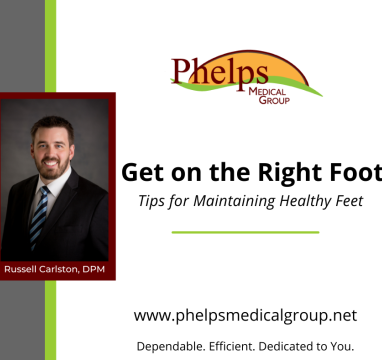Education
April is National Foot Health Awareness Month. Have you ever thought about how much our feet do for us? Think about it... they support us, allow us to stand, balance, walk, run, and jump. It's easy to take our feet for granted and perhaps even forget to take care of them.
Here are some recommendations from Dr. Carlston on how you can maintain healthy feet:
- Wash your feet. Wash your feet daily to remove all the dirt and bacteria that can build up. Make sure you dry them completely after washing, especially between the toes.
- Moisturize your feet. Unfortunately it's easy for feet to dry out and crack and lead to pain and other problems. A good moisturizer will help keep your keep your skin softer and healthier, but make sure to keep moisturizer to a minimum between your toes.
- Walk. Exercise. Be more active. The more you exercise the better the blood flow is to your feet. Although swimming and bike riding are good, a simple walk is often the best exercise for your feet. Since your feet carry the entire weight of your body, excess weight puts extra stress on your feet. Try to keep an ideal body weight for healthier feet and overall wellbeing.
- Wear comfortable shoes. Good quality shoes that fit well are key to avoiding foot pain, blisters, calluses, sore heels, and other problems. Rotating shoes daily also helps your shoes dry out before the next wear. When buying shoes, get them later in the day when your foot is larger and probably more swollen than earlier in the day. Don’t go barefoot outside.
- Wear clean socks. Your feet produce more sweat than any other part of your body. Clean socks absorb moisture and keep it away from your feet. Socks also protect your feet. If you are diabetic, white socks are preferred since you will more easily be able to see blood or drainage when you take them off.
- Trim your toenails properly. You should trim your toenails every few weeks. Trim the nail straight across to avoid in grown nails.
- Examine your feet regularly. Make a habit of checking your feet for problems such as cuts, bruises, sores, or swelling. Ask a family member to help or use a mirror to look at the bottom of your feet. If a problem doesn’t heal within a few days let your doctor know. Daily feet inspections are especially important if you have diabetes.
If you have concerns about your feet, contact Dr. Carlston, at Phelps Medical Group 308.995.6111



